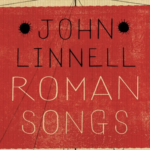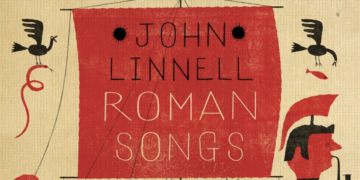

Those who know Latin know Wheelock’s Latin as the time-honored resource for learning the language of the Caesars. They also know how many years of intensive study and practice goes into translating the textbook’s hefty classical passages. Reading Latin is one thing — writing in the language is quite another: something very few people do for any reason, other than a perverse kind of enjoyment that is most definitely a niche affair.
What about songwriting in Latin? Professor Wheelock doesn’t offer any specific instructions for composing pop music in the dead language, though classics teacher and former British Labour Party MP Eddie O’Hara once translated Beatles songs (see “O Teneum Manum” and “Dei Duri Nox” here). For a more casual approach, one could turn to a resource more in line with contemporary teaching methods — Duolingo, where you can “learn a language for free. Forever.”
For some reason, John Linnell, one of the two Johns in 90s alt-rock band They Might Be Giants, decided on the Duolingo approach while hunkered down at home during the pandemic, and — because he’s a songwriter, and a right good one, at that — he decided to compose some catchy pop songs in Latin. Catchy, he could do (I’m still singing the chorus of “Birdhouse in Your Soul” thirty-two years later.) But the Latin, not so much.
After taking a short course, Linnell writes, “I figured I could write a few songs… I was soon disabused of the notion. I can barely string two words together in Latin, and to borrow from Mark Twain, I would rather decline two drinks than one Latin noun.” A career Latinist and childhood friend Linnell calls “Schoolmaster Smith” came to his aid, translating his English lyrics into Latin for him. “All credit for any success in this project is due to him,” he avers, “and any mistakes and failures are entirely mine.”
Trapped at home with his son Henry, who played guitar on the 4-track EP, Linnell recorded and released Roman Songs (along with a t-shirt!). Why? “All I can tell you,” he shrugs, “is that I’m deeply jealous of people who are fluent in a second language and can apply that skill to their creative work in a way that doesn’t seem like cultural appropriation of the most offensive and embarrassing kind.”
No ancient Romans around to accuse Linnell of stealing their culture, but they’d be hard pressed to recognize if they were. “HAEC QVOQVE EST RES” (“This is Also the Case”) and “TECVM CIRCVMAMBVLARE NOLO” (“I Don’t Want to Walk Around with You”) sound like classic They Might Be Giants tunes. (The other John, Mr. Flansburgh, “strongly encouraged this project and art directed the package,” Linnell writes.)
In fact, they sound so much like They Might Be Giants songs, I almost wish they were in English, but as a lover of Latin I have to admit, it’s fun to learn these phrases and melodies and walk around singing them like a Roman pop star. Linnell may be a little in the dark about his motivations, but I say, good on him: if there’s any way to make Latin live again, this may be it. Now we just need someone talented and really bored to step up and deliver classical raps to keep momentum going…. Pick up Linnell’s Roman Songs EP here.
via Boing Boing
Related Content:
Why Learn Latin?: 5 Videos Make a Compelling Case That the “Dead Language” Is an “Eternal Language”
Learn Latin, Old English, Sanskrit, Classical Greek & Other Ancient Languages in 10 Lessons
Josh Jones is a writer and musician based in Durham, NC. Follow him at @jdmagness
They Might Be Giants’ John Linnell Releases an EP of Songs in Latin is a post from: Open Culture. Follow us on Facebook and Twitter, or get our Daily Email. And don't miss our big collections of Free Online Courses, Free Online Movies, Free eBooks, Free Audio Books, Free Foreign Language Lessons, and MOOCs.
from Open Culture https://ift.tt/3roFaMU
via Ilumina


Comments
Post a Comment